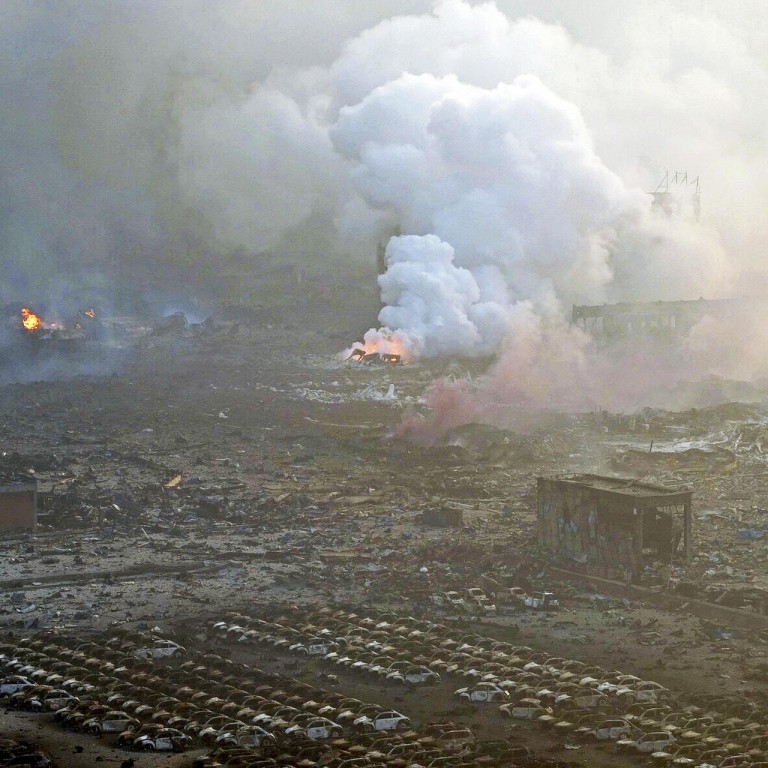
Tianjin's hell on earth as huge chemical blasts decimate Chinese port, killing at least 55
Apocalyptic scenes as chemical explosions, one with the force of more than 20 tonnes of TNT detonating, rip through mainland port, killing at least 55 and injuring hundreds
The death toll in Wednesday's huge chemical blast in the Chinese port city of Tianjin has risen to 55, including 17 firefighters, as environmentalists warned that rain forecast to fall today could transfer toxic air-borne chemicals into nearby waterways.
Two massive explosions - one with the force of 21 tonnes of TNT detonating - shortly after 11.30pm on Wednesday in Ruihai International Logistics' hazardous goods warehouse sent huge fireballs into the air.
We lived through the Tangshan earthquake … but [this] was more horrific
The city government said 701 people were receiving treatment in hospitals and 71 remained in critical conditions.
Four Hongkongers were among the injured and two remained in hospital.
The fire in Tianjin, 140km southeast of Beijing, spread across 20,000 square metres of an industrial park in the city's port.
Tall plumes of grey and white smoke and a pungent smell lingered more than a day after the blast, requiring rescue personnel and journalists to wear protective masks.
READ MORE: I thought I was going to die: Tianjin residents recall their long night of fear
National earthquake authorities recorded tremors created by the blasts and likened the second blast to 21 tonnes of TNT, the first to three tonnes.
Pictures posted online showed fireballs shooting into the sky and victims covered in blood running for their lives.
Cargo containers and thousands of vehicles nearby were blown apart, flipped or burnt down. Windows on office and apartment buildings kilometres away were shattered.
The local government is yet to conclude what caused the explosion. A team of more than 200 military specialists in handling nuclear and biochemical materials has been deployed.
The explosion has prompted questions over how the warehouse could have been built so close to residential buildings.
READ MORE: Tianjin's homeless look for shelter as troops trained in chemical warfare enter blast site
The said there were at least 700 tonnes of sodium cyanide, a toxic chemical often used in mining to extract gold, in wooden boxes and metal containers at the blast site. Some of the chemical had been detected in a ditch, suggesting leakage.
Residents said they had difficulty breathing, but authorities said the level of six air pollutants in the city remained acceptable. Authorities predicted the prevailing wind would blow pollutants towards the Bohai Sea, away from Beijing.

A 66-year-old man who lives on the 13th floor of a residential building within 1.5km of the site said the blast was worse than an earthquake that killed more than 240,000 people decades ago.
"We lived through the Tangshan earthquake in 1976, but last night's explosion was even more horrific. After the deafening sound, the shockwaves came and windows flew out," said the man, who hid in the corner of a room with his wife until firefighters came before 3am to fetch them.
A 55-year-old woman said she was literally blown off her bed by the shockwaves.
"Even elevator doors within our building were deformed," she said.
Her family escaped from their apartment building and spent the night on the street before being directed to a resettlement camp and barred from returning to their home.
The environmental organisation Greenpeace Beijing expressed concerns over the health risks posed by certain chemicals after two massive explosions rocked the area on Wednesday night.
Greenpeace, citing information from Tianjin Tanggu Environmental Monitoring Station, said the company also stored calcium carbide in addition to the chemicals mentioned by the Daily.
The three chemicals are highly toxic and can present health threats both with short and long-term exposure.
Greenpeace also warned that rain could transfer air-borne pollutants into water systems as rain was forecast for the city on Friday.
State-run CCTV reported the senior management of Ruihai International Logistics had been detained by authorities.
IN PICTURES: Huge explosions in Tianjin leave dozens dead, injured
Rescue efforts were suspended yesterday morning due to uncertainty about which chemicals were on site. They resumed in the afternoon.
said more than 36 fire fighters were missing; 17 were confirmed dead.
More than 6,000 residents were evacuated and half were still waiting to be directed to resettlement spots.
More than 1,000 medical staff, including some specialists in burns and orthopaedics from 10 local hospitals had been deployed, according to Tianjin city government officials at a press conference.

The head of the Tianjin fire service said they had received alerts from local residents before 11pm.
President Xi Jinping had told the city authorities to contain the fire and rescue the injured, the China News Service reported.
Ruihai International Logistics says on its website that it was established in 2011 and is an approved company for handling hazardous materials. It says it handles one million tonnes of cargo annually.
Tianjin, with a population of about 15 million, is one of the country's major ports. It is also one of the mainland's more modern cities and is connected to the capital two hours' drive away by a high-speed rail line.


